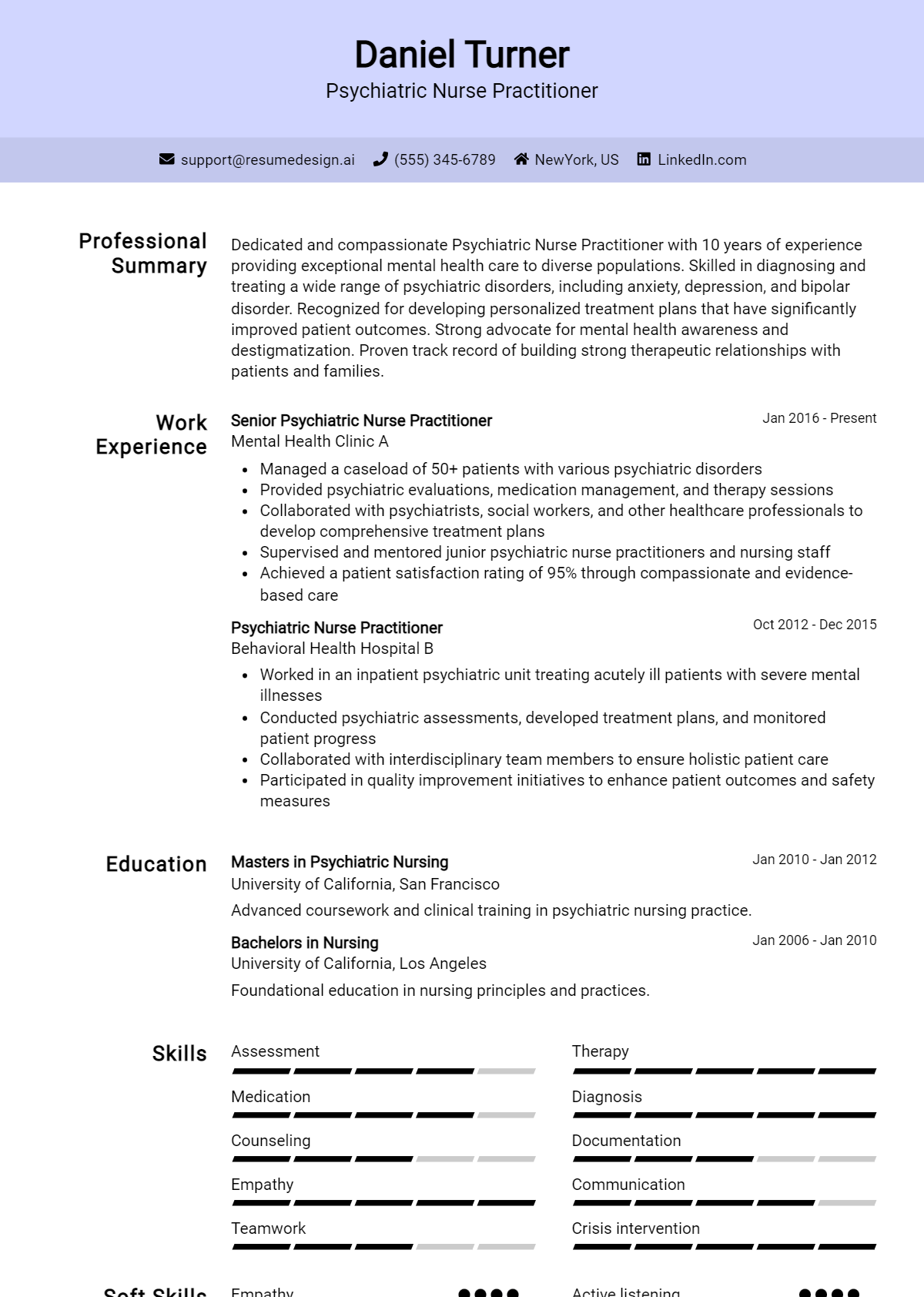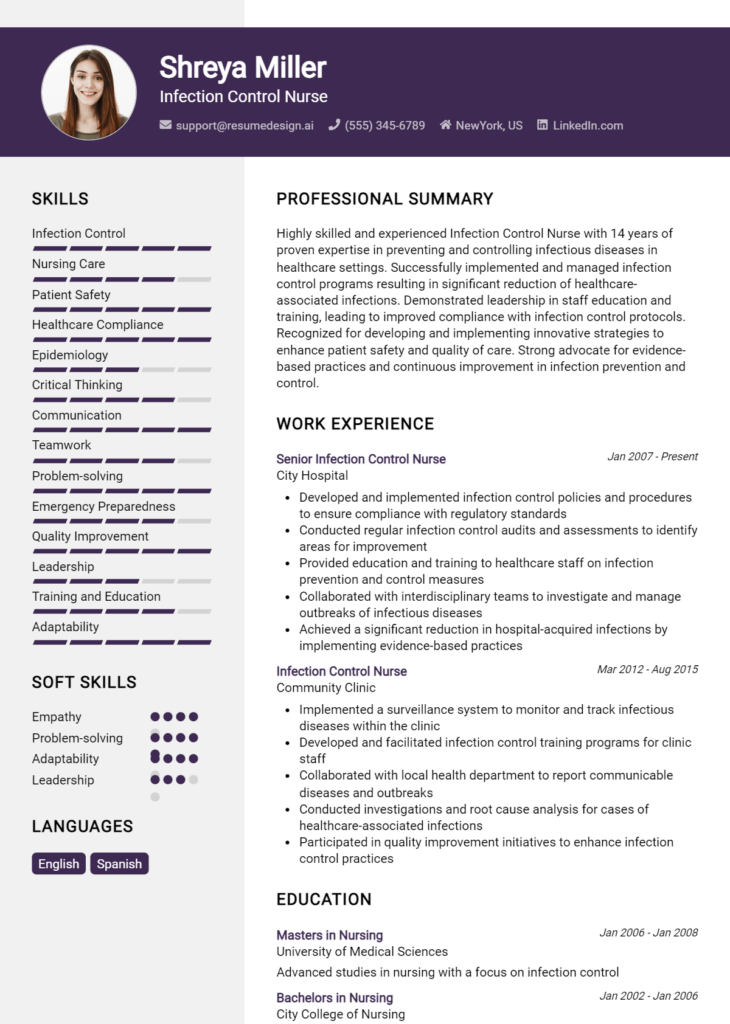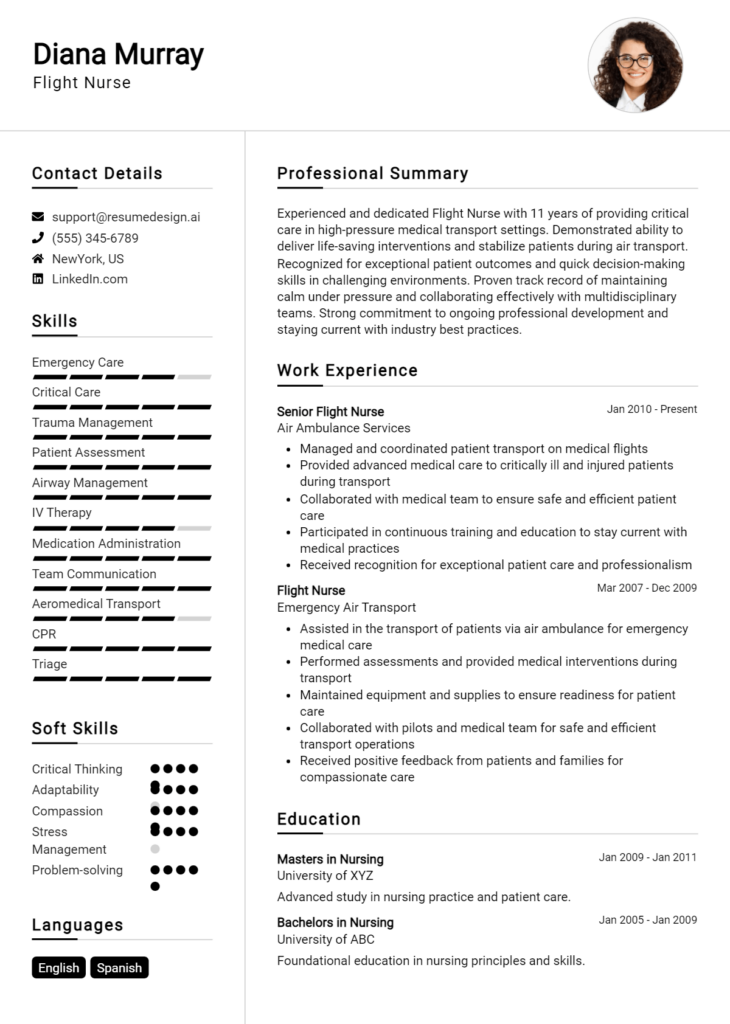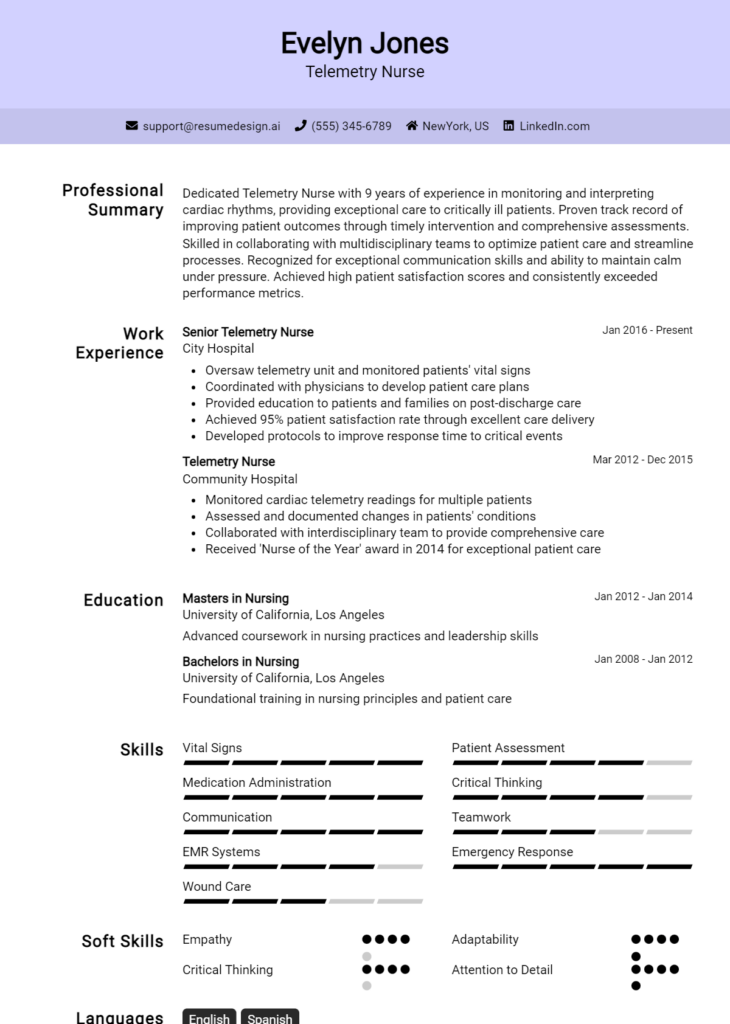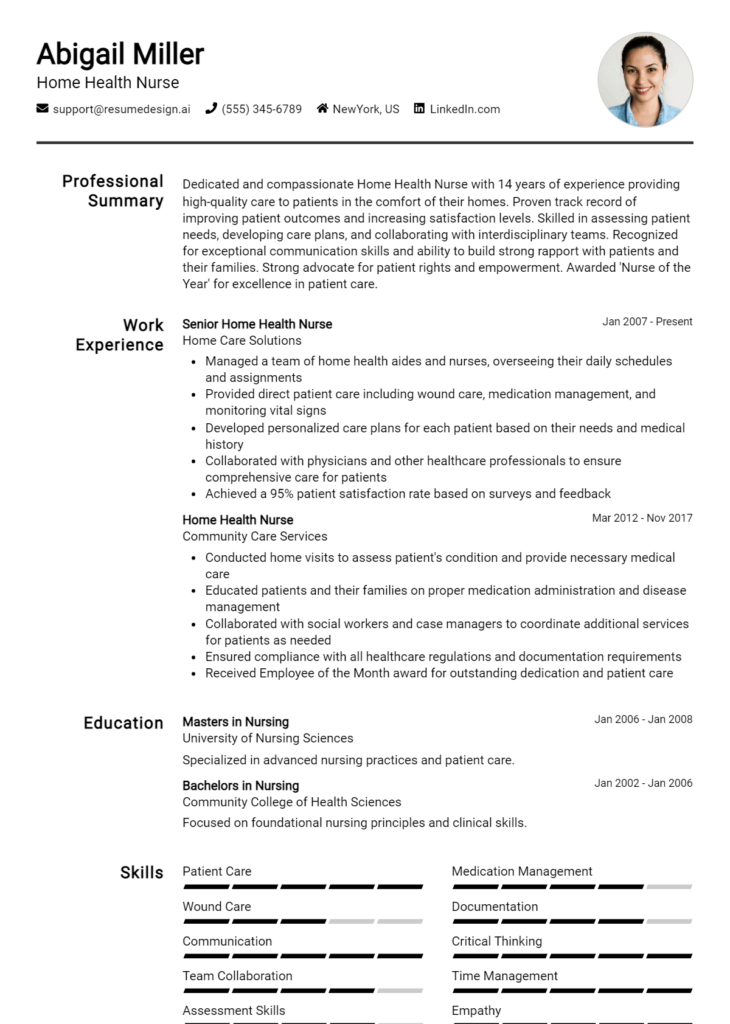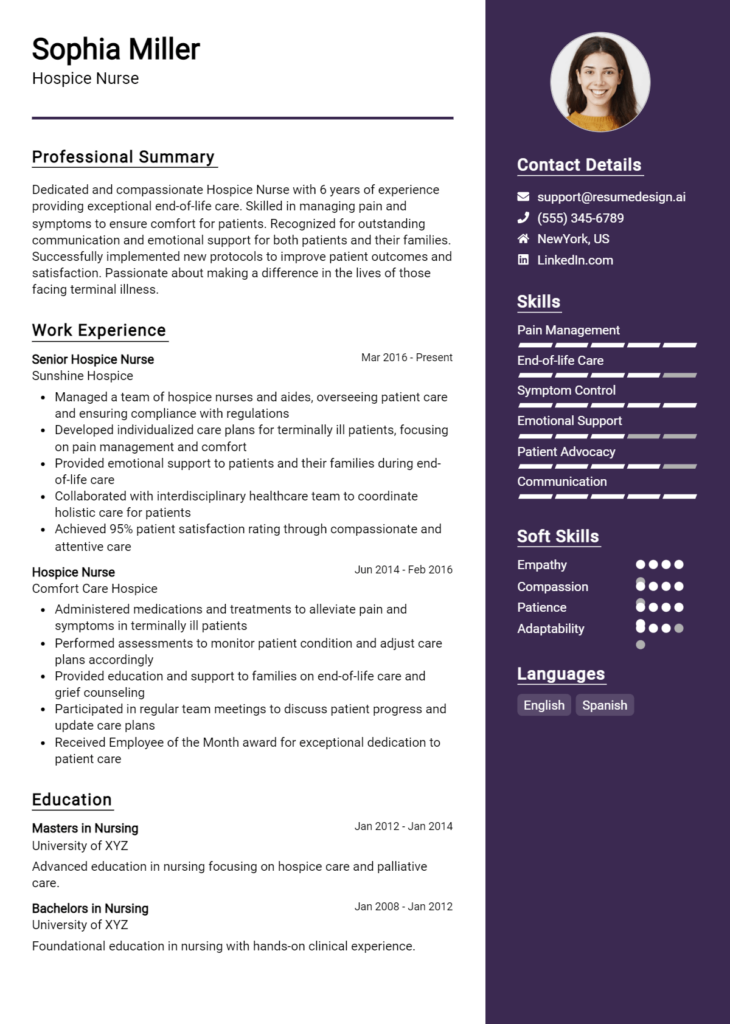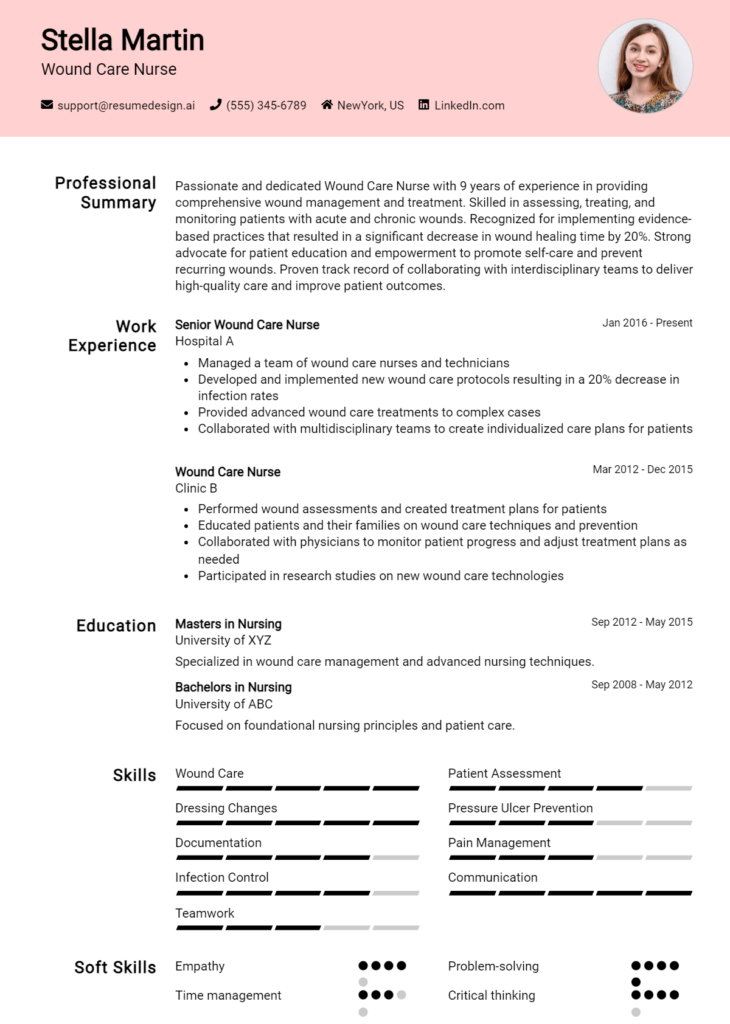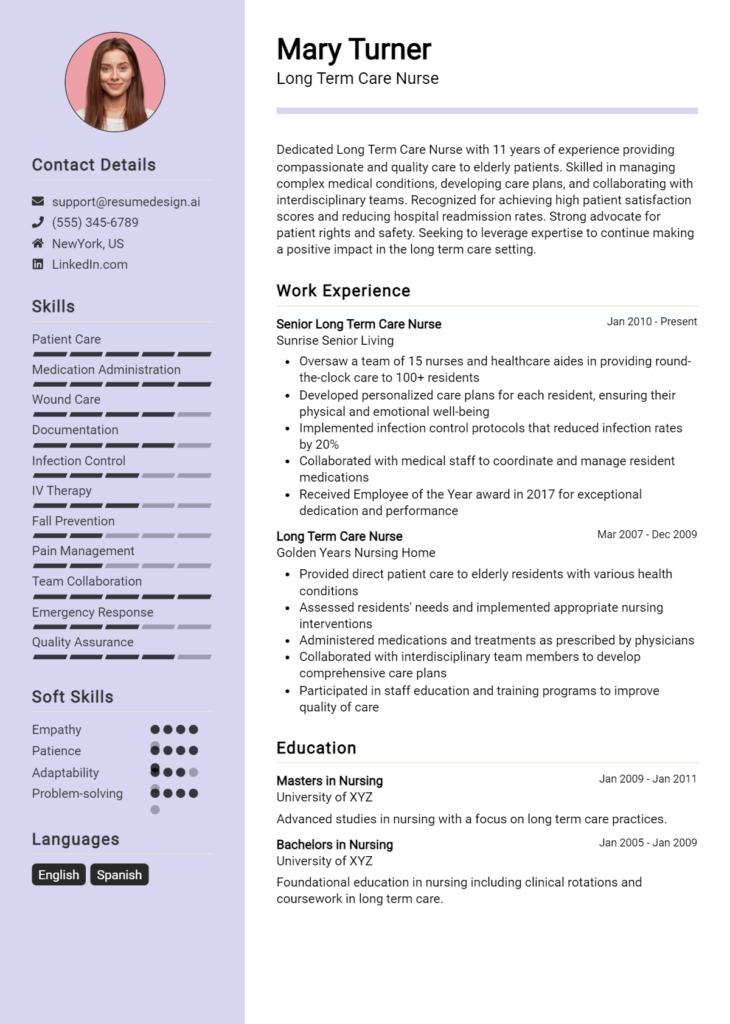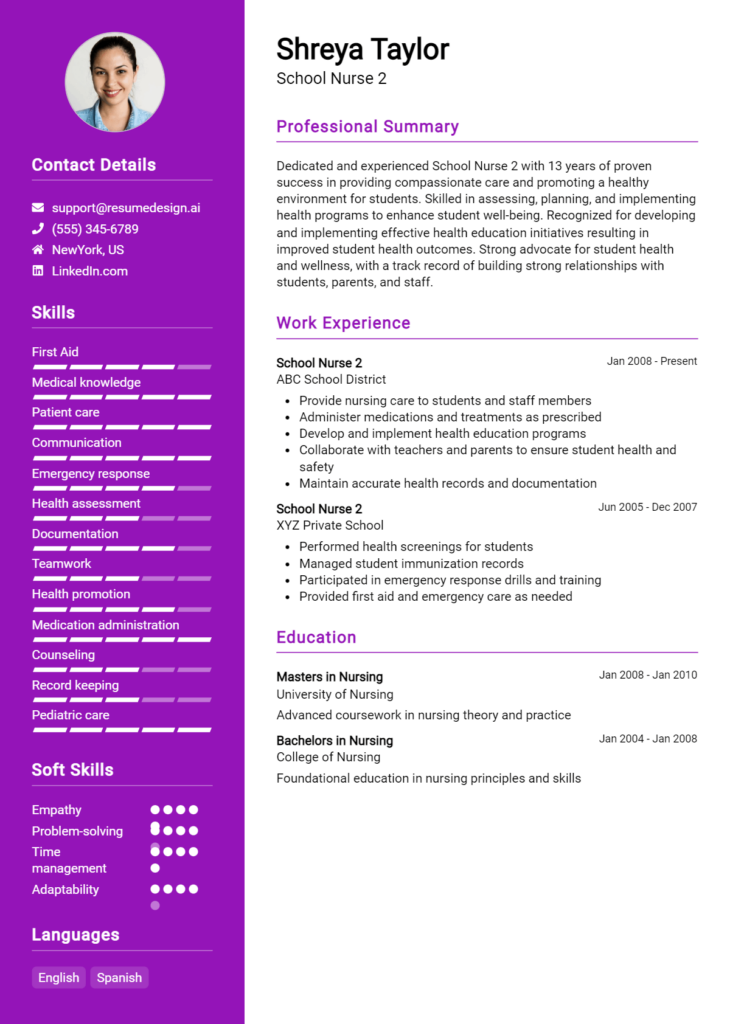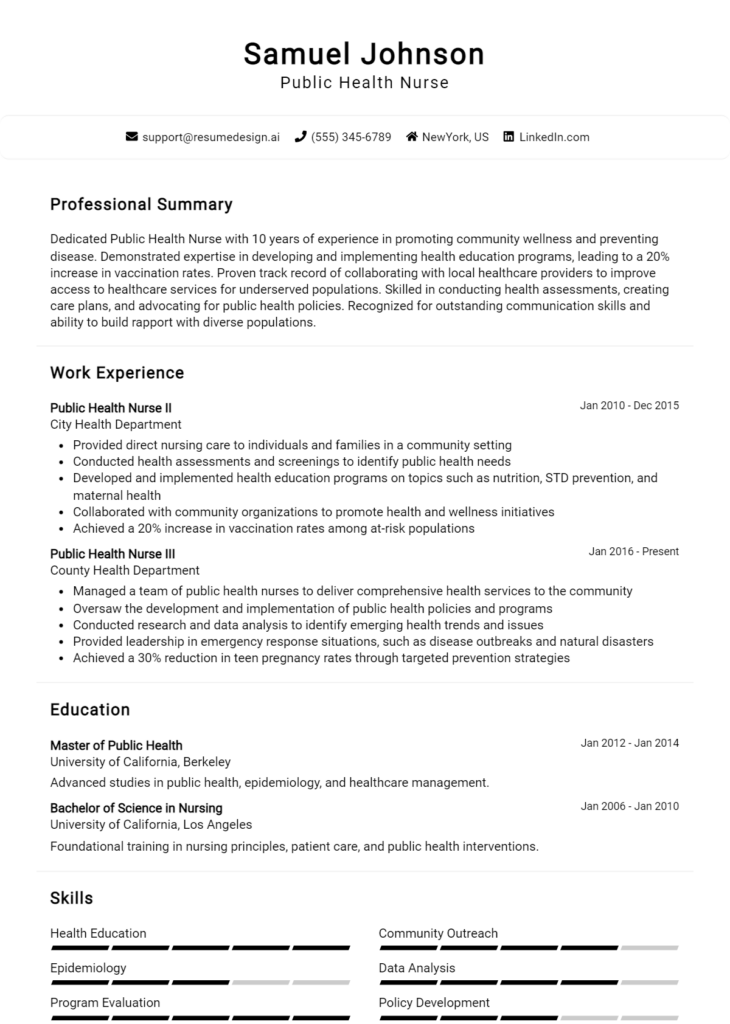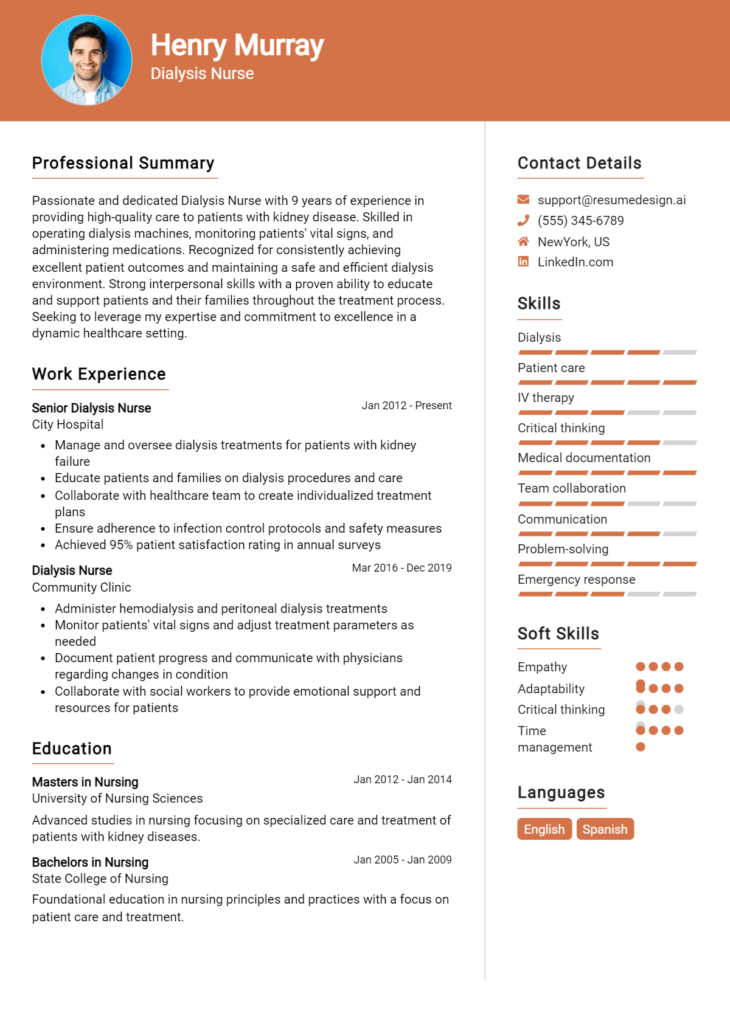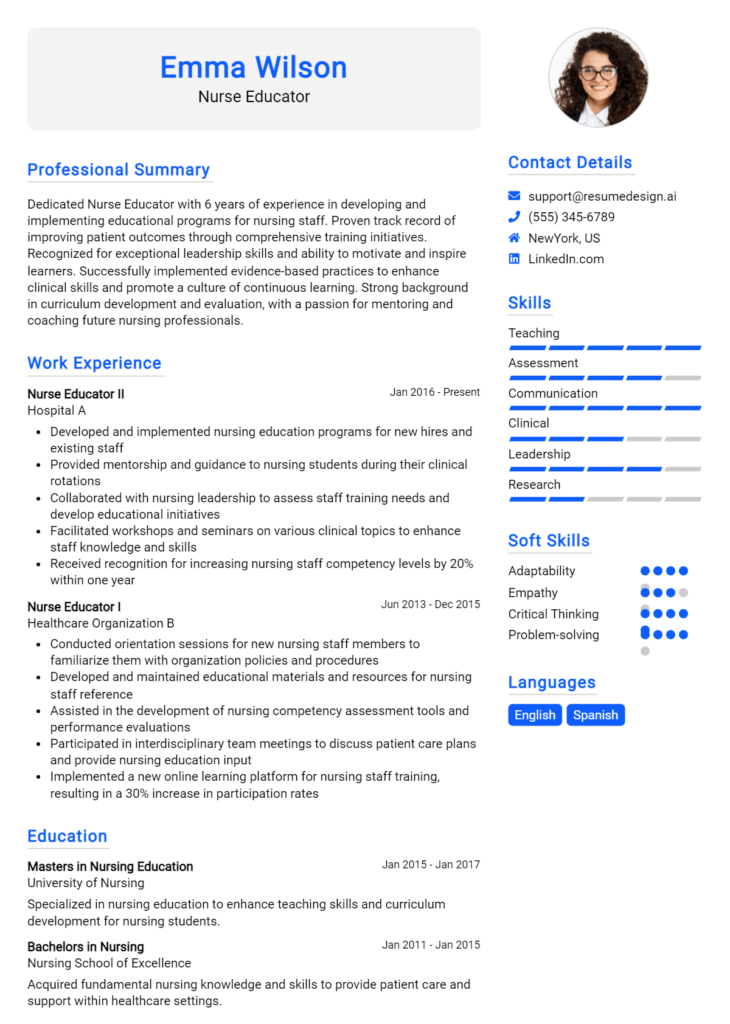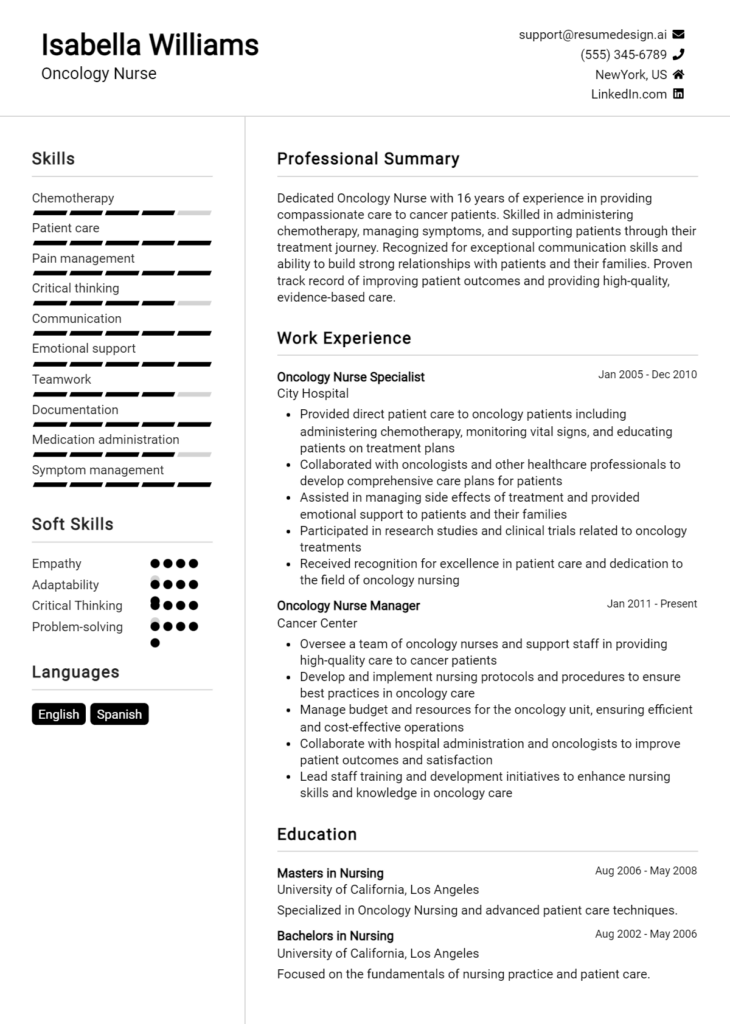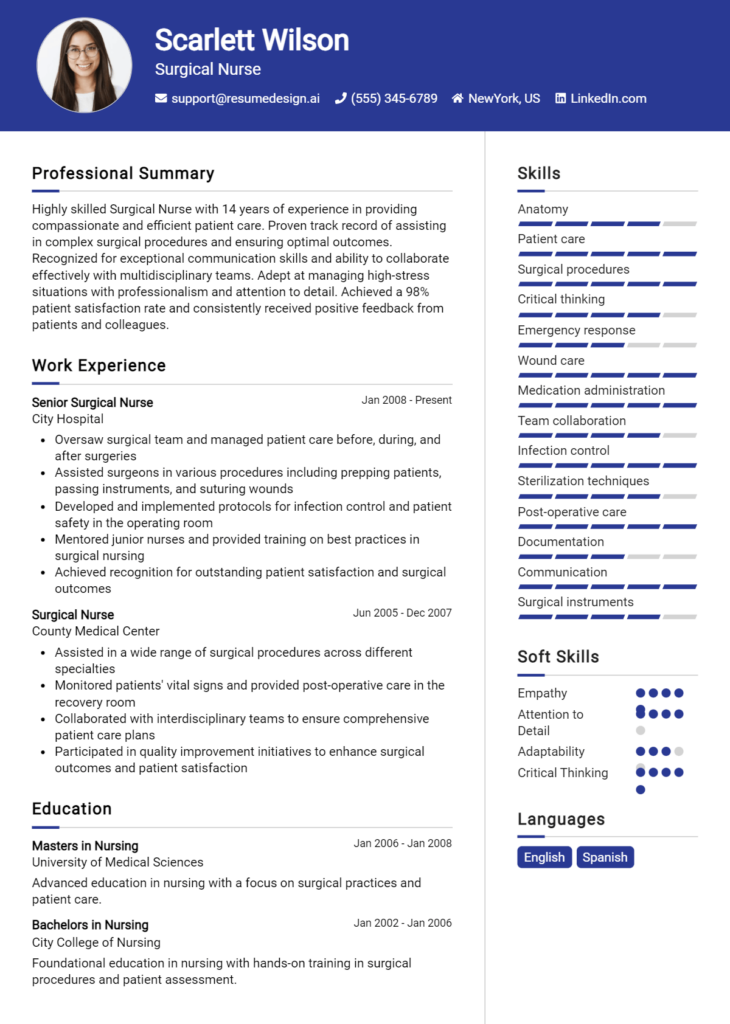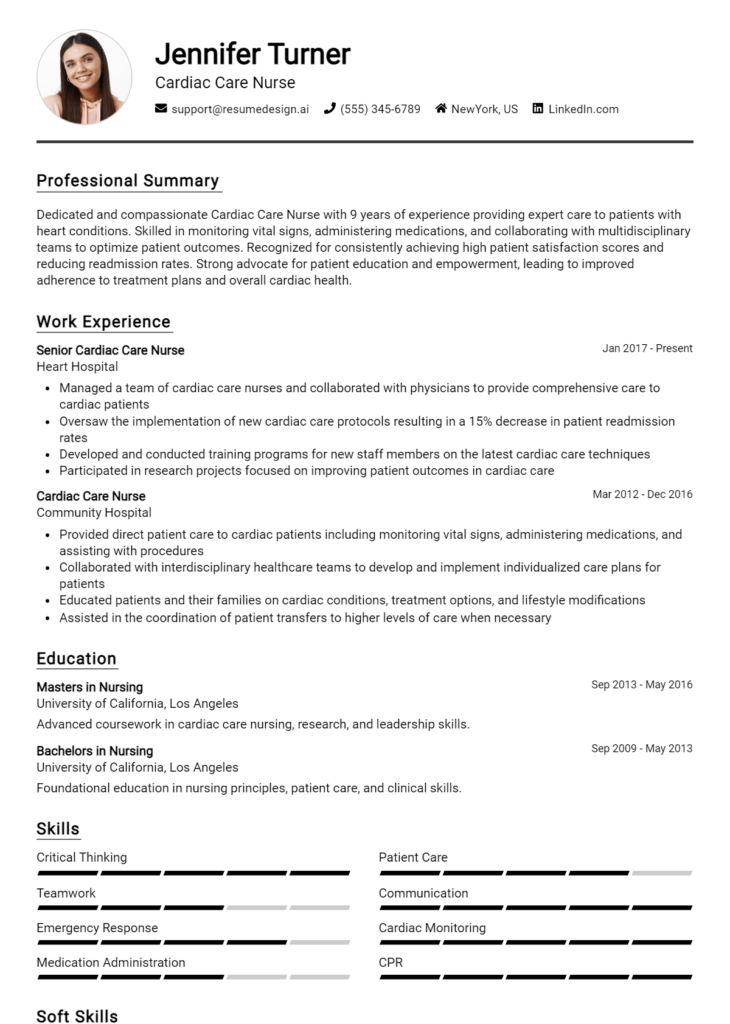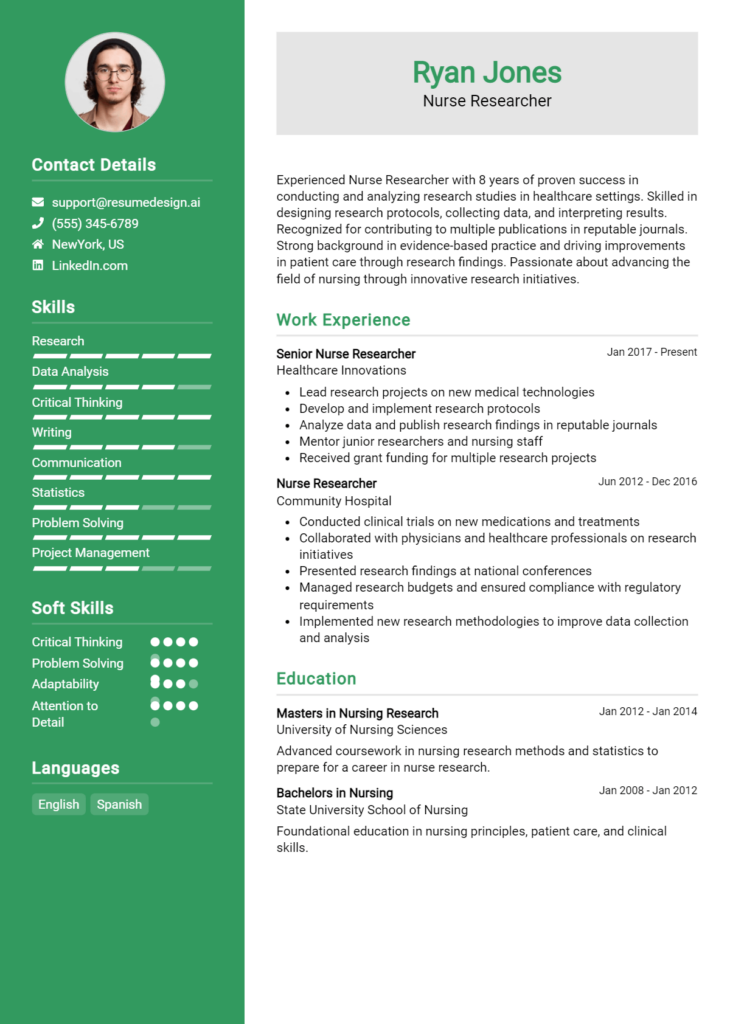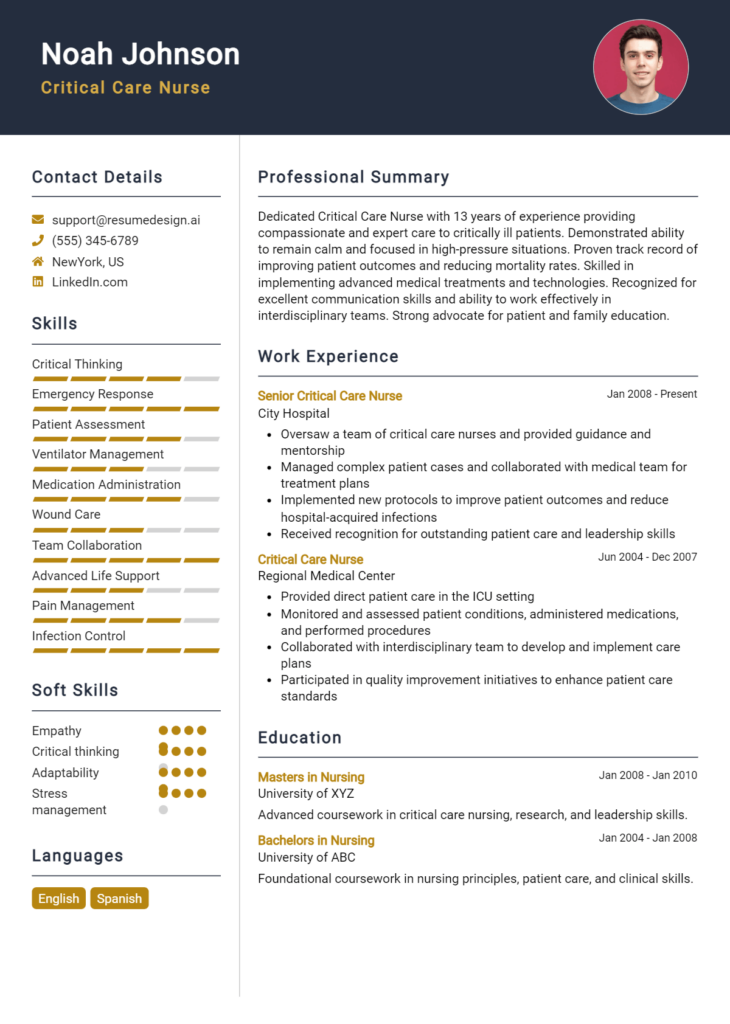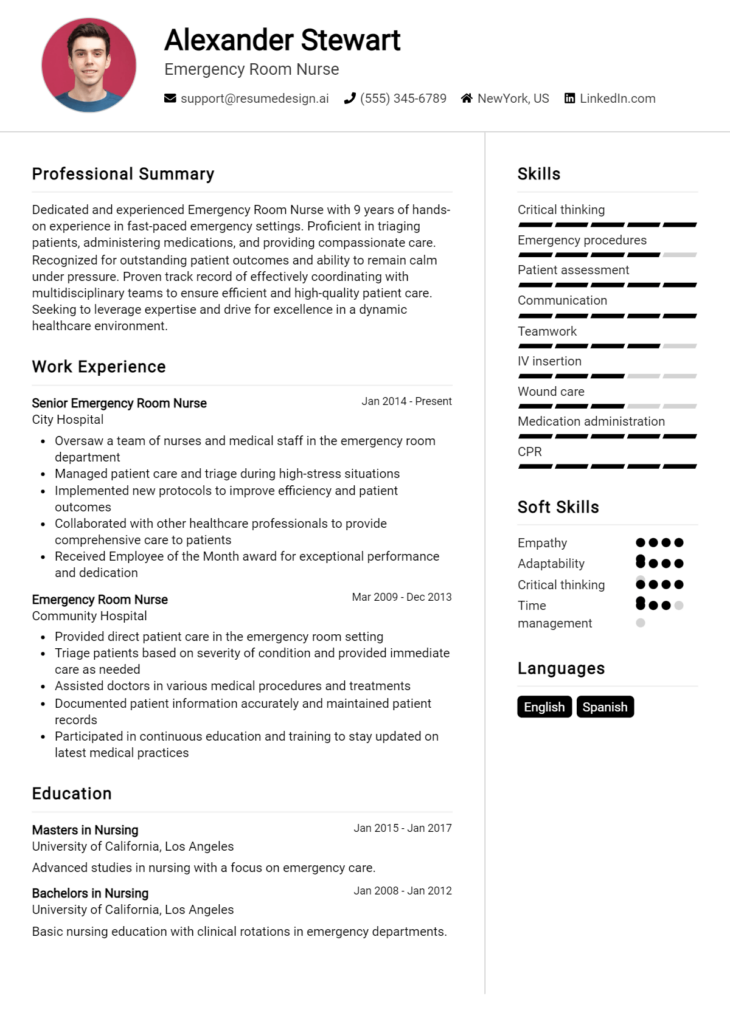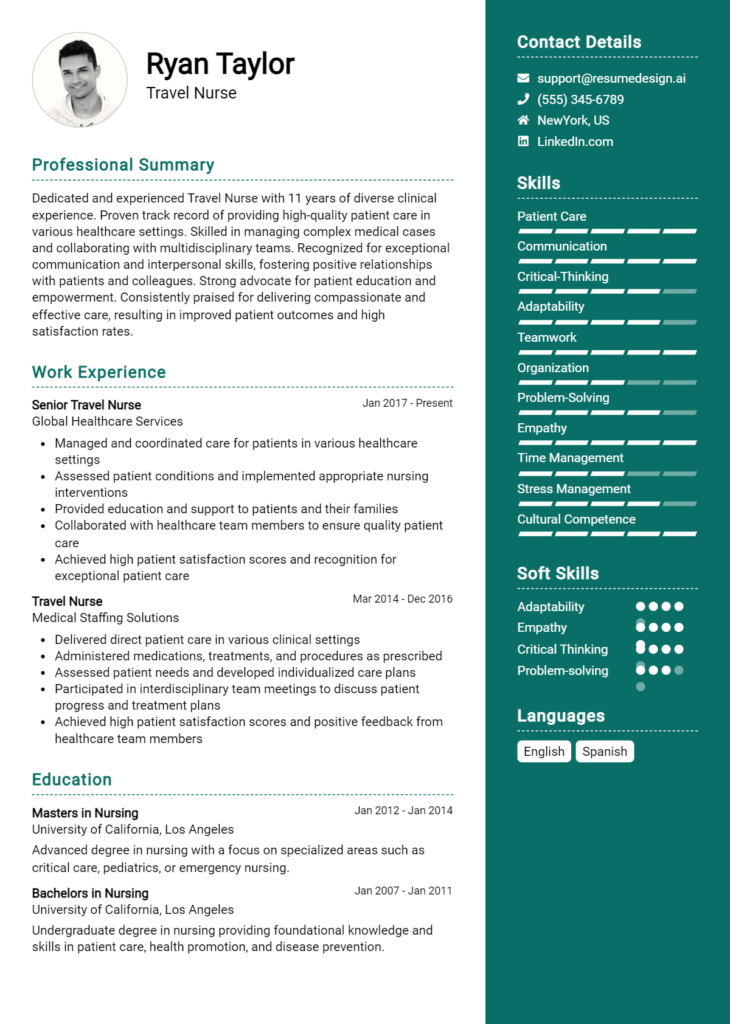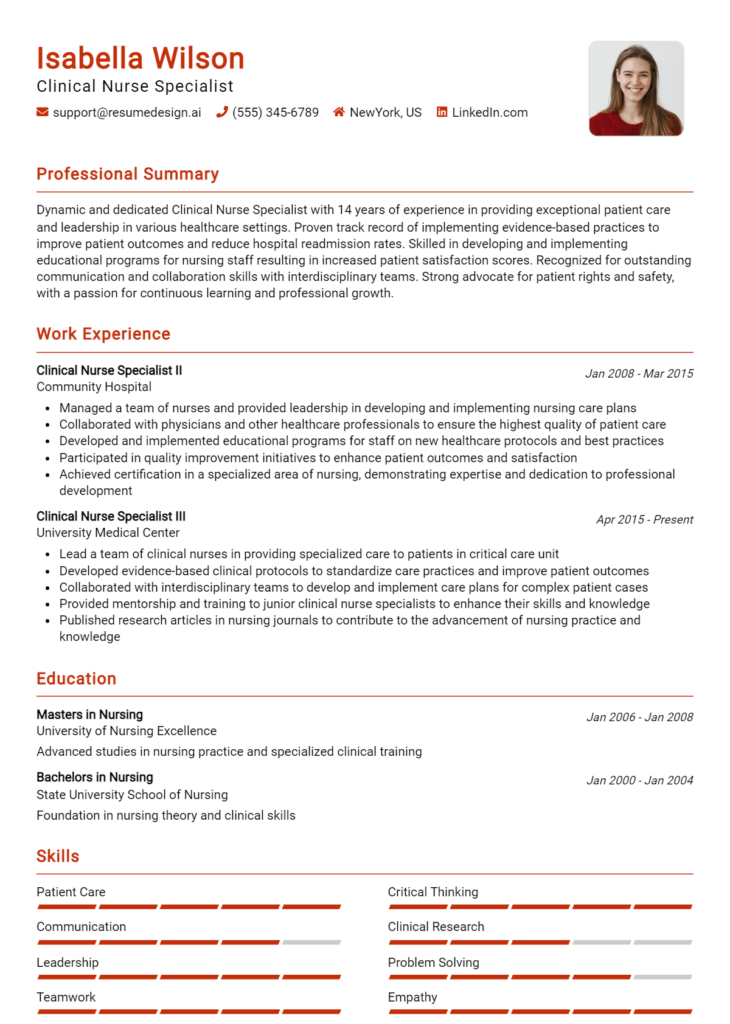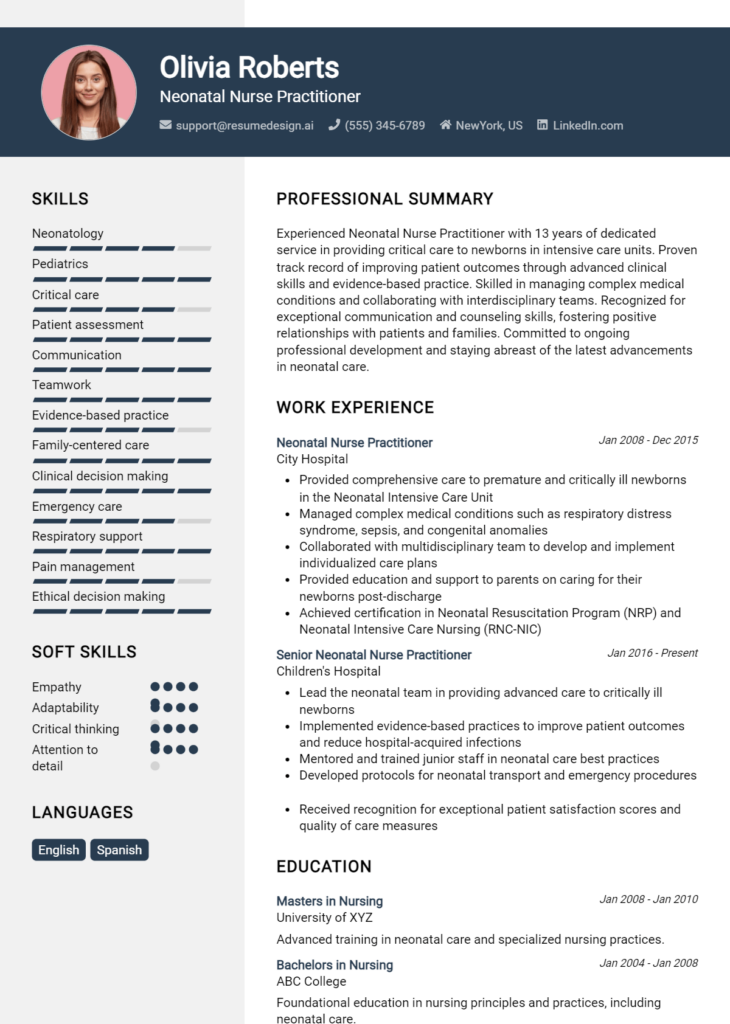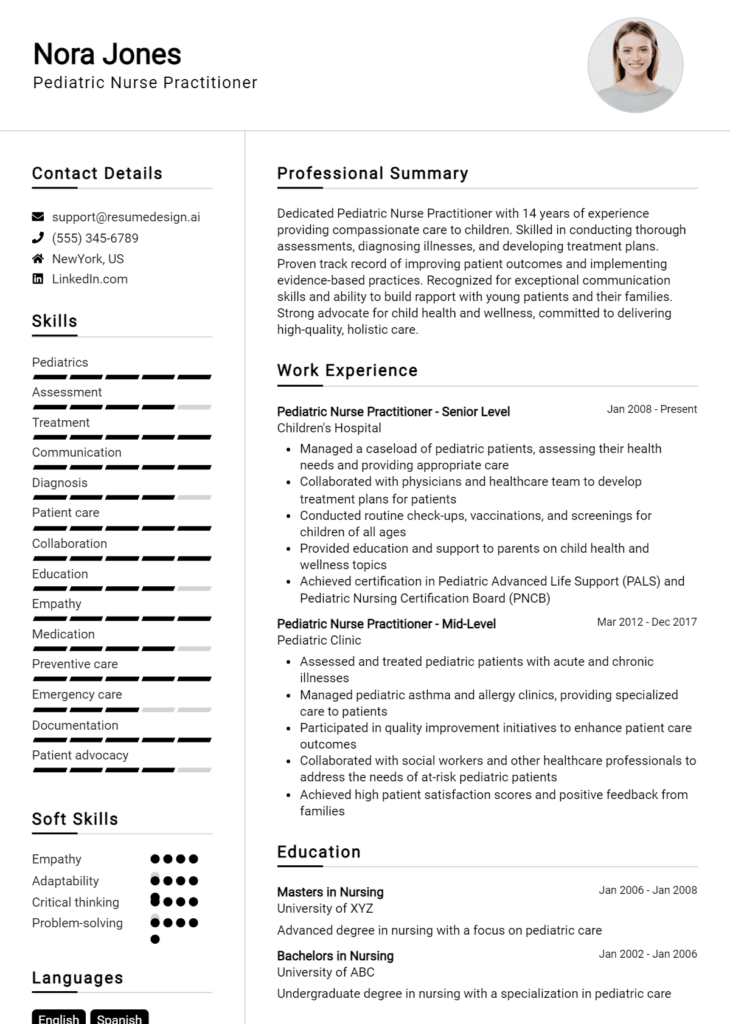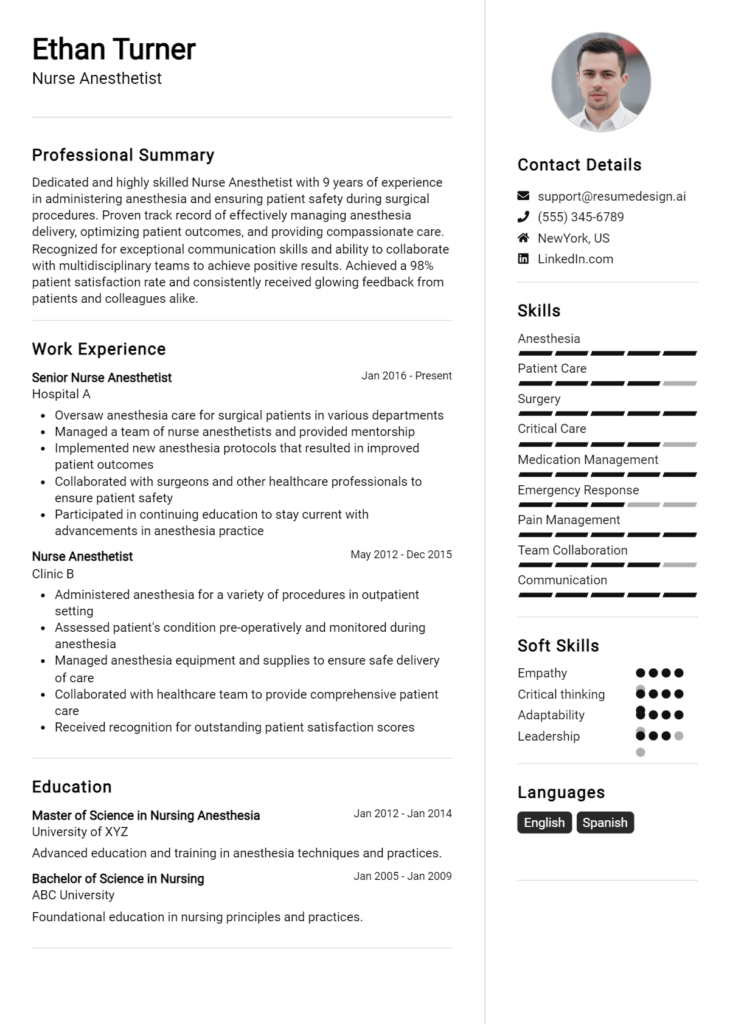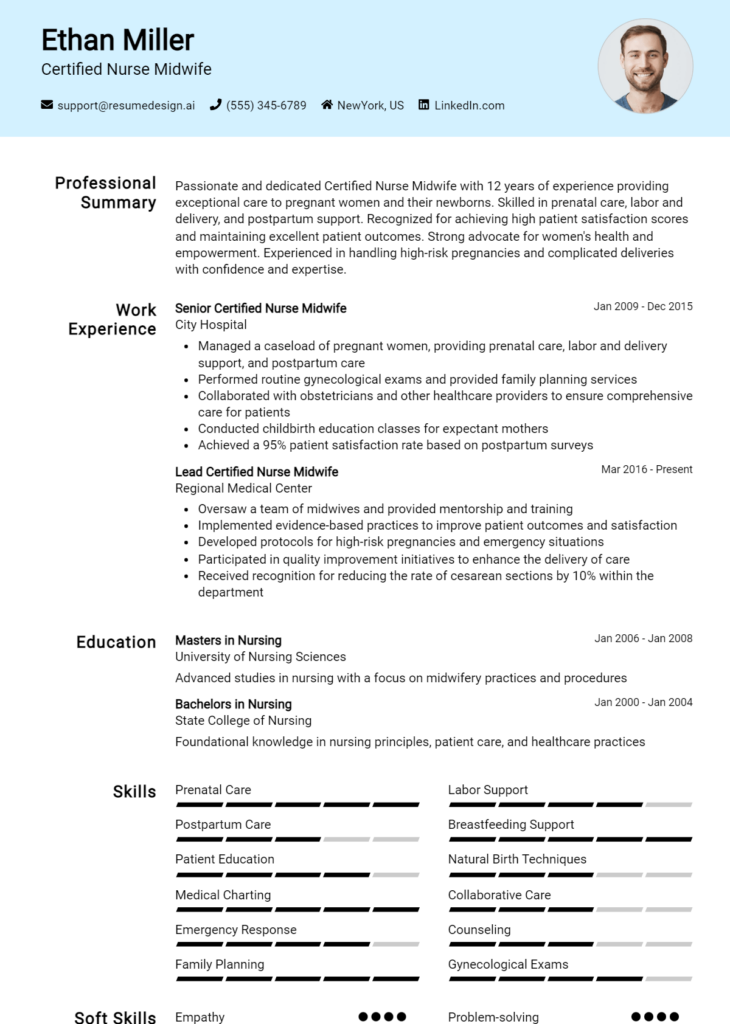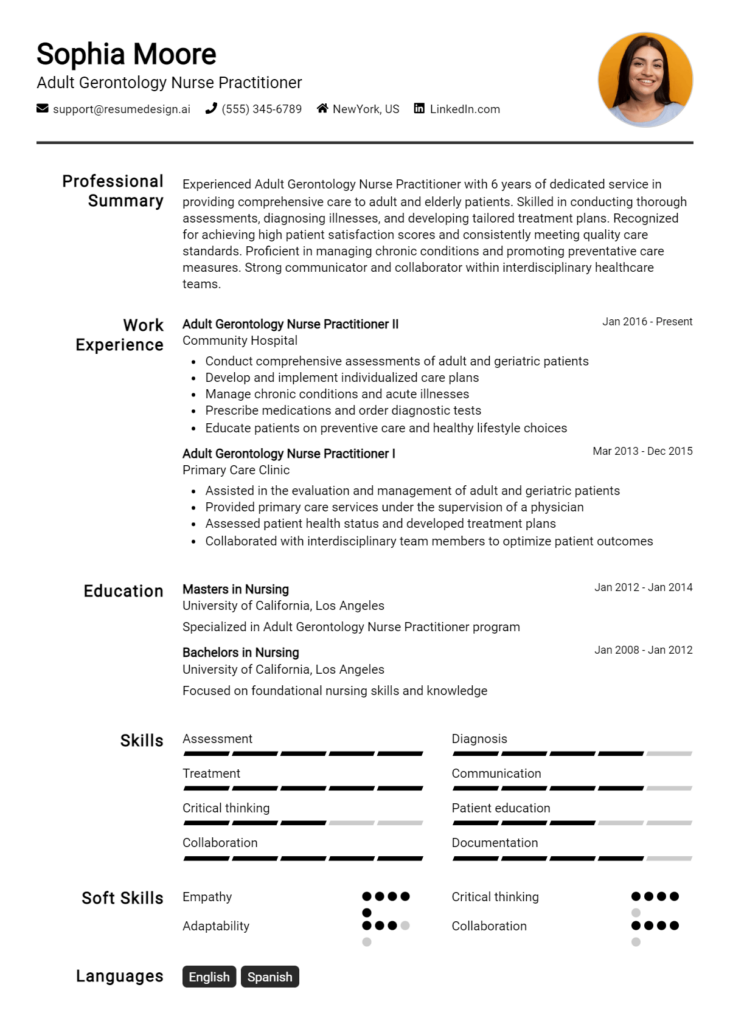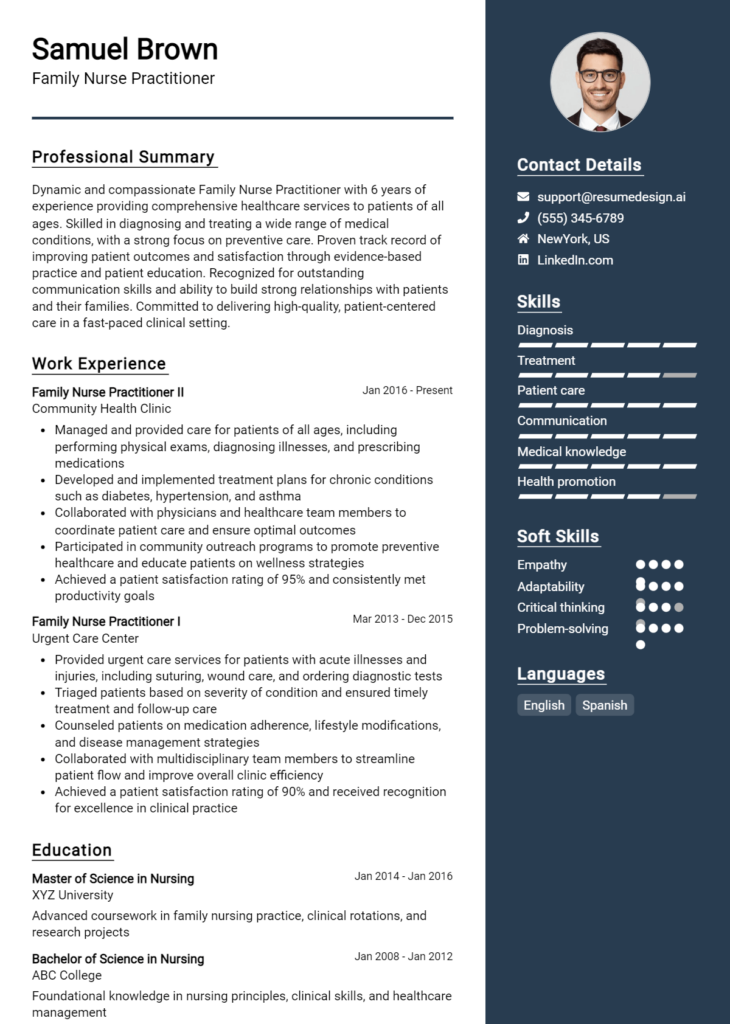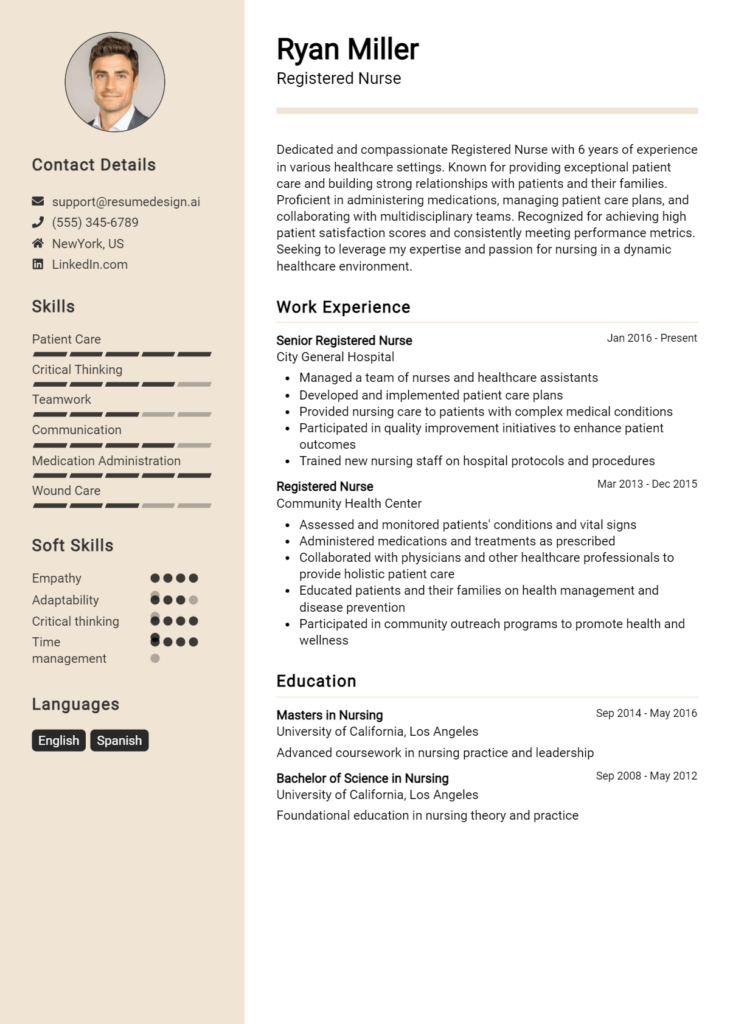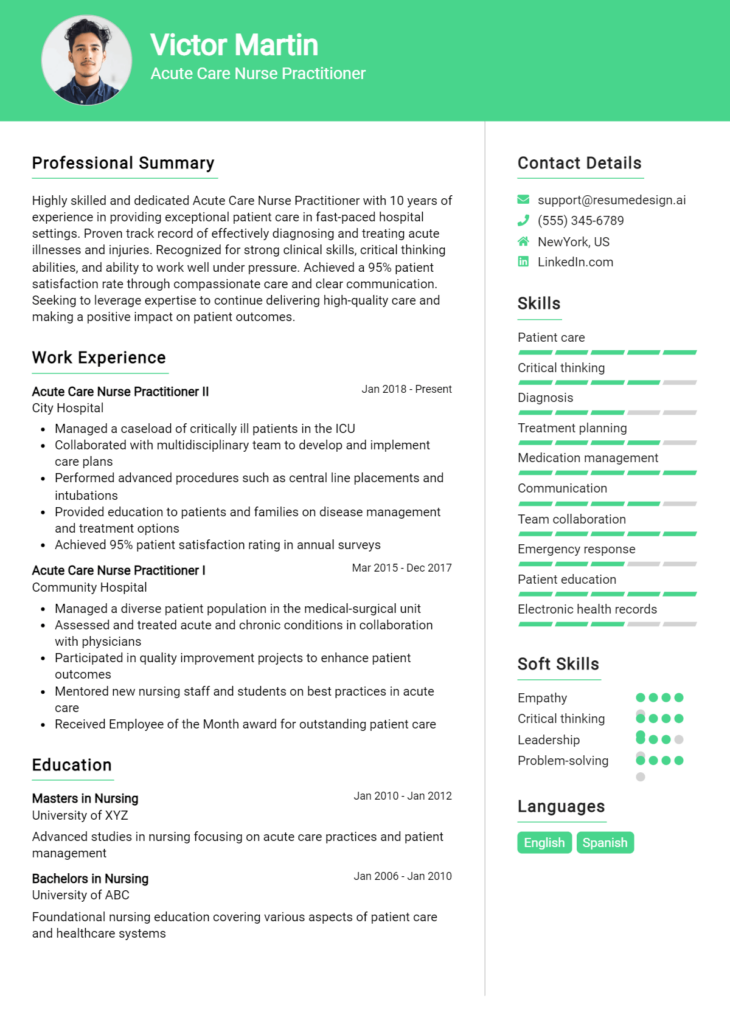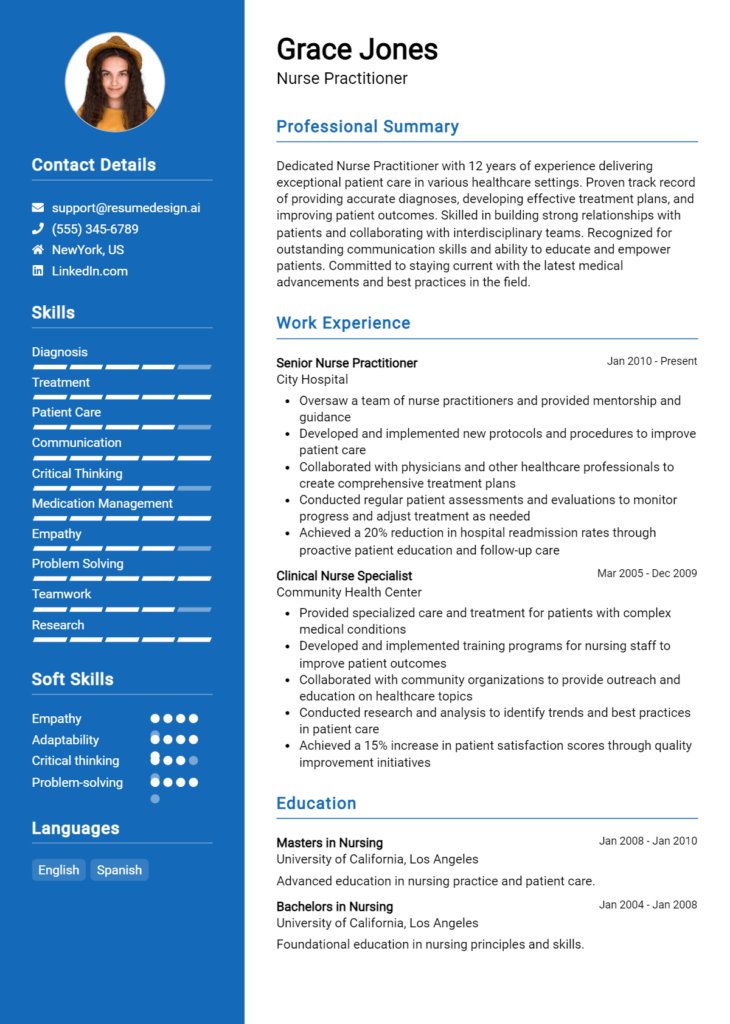Psychiatric Nurse Practitioner Core Responsibilities
A Psychiatric Nurse Practitioner (PNP) plays a crucial role in mental healthcare, combining clinical expertise with strong problem-solving abilities. Their core responsibilities include diagnosing mental health disorders, developing treatment plans, and providing psychotherapy. PNPs often collaborate across departments, working with psychiatrists, social workers, and primary care providers to ensure comprehensive patient care. Technical skills in patient assessment and operational abilities in managing treatment protocols are essential for success, as these contribute to organizational goals of improved patient outcomes. A well-structured resume can effectively highlight these qualifications, showcasing the candidate's blend of clinical and interpersonal skills.
Common Responsibilities Listed on Psychiatric Nurse Practitioner Resume
- Conduct comprehensive psychiatric evaluations and assessments.
- Develop and implement individualized treatment plans.
- Provide psychotherapy and counseling services to patients.
- Prescribe and manage psychiatric medications.
- Collaborate with healthcare teams to optimize patient care.
- Monitor patient progress and adjust treatment as necessary.
- Educate patients and families about mental health conditions.
- Document patient interactions and treatment plans accurately.
- Participate in case conferences and multidisciplinary team meetings.
- Conduct crisis interventions and develop safety plans.
- Engage in continuous professional development and training.
High-Level Resume Tips for Psychiatric Nurse Practitioner Professionals
For Psychiatric Nurse Practitioner professionals, a well-crafted resume is not just a piece of paper; it's the first impression that can open doors to exciting career opportunities. In a competitive job market, your resume needs to stand out by effectively showcasing your unique skills, experiences, and achievements. A thoughtfully designed resume will reflect your qualifications and demonstrate your genuine passion for mental health care, making it essential for capturing the attention of potential employers. This guide will provide practical and actionable resume tips specifically tailored for Psychiatric Nurse Practitioner professionals, ensuring you present yourself in the best light possible.
Top Resume Tips for Psychiatric Nurse Practitioner Professionals
- Tailor your resume to the job description by incorporating relevant keywords and phrases that align with the specific role you are applying for.
- Highlight your clinical experience and any specialized training in psychiatric nursing, ensuring that it's prominently displayed.
- Quantify your achievements where possible, using metrics to demonstrate the impact of your work, such as improved patient outcomes or increased efficiency in care delivery.
- Include a professional summary at the top of your resume that succinctly captures your qualifications and career goals.
- Emphasize industry-specific skills such as therapeutic communication, crisis intervention, and knowledge of mental health disorders.
- List relevant certifications and licenses prominently, including any advanced certifications in psychiatric and mental health nursing.
- Showcase your collaborative skills by detailing your experience working with multidisciplinary teams or in community health settings.
- Utilize bullet points for clarity and conciseness, making it easier for hiring managers to quickly scan your resume.
- Keep the formatting clean and professional, using consistent fonts and styles to enhance readability.
- Proofread meticulously to eliminate any typos or grammatical errors, as attention to detail is crucial in healthcare professions.
By implementing these tips, you can significantly enhance your chances of landing a job in the Psychiatric Nurse Practitioner field. A well-tailored resume that effectively highlights your skills and achievements will not only capture the attention of hiring managers but also position you as a strong candidate ready to make a meaningful impact in mental health care.
Why Resume Headlines & Titles are Important for Psychiatric Nurse Practitioner
In the competitive field of psychiatric nursing, a well-crafted resume headline or title serves as a vital first impression that can set a candidate apart from the crowd. For a Psychiatric Nurse Practitioner, a strong headline not only captures the attention of hiring managers but also succinctly summarizes the candidate's key qualifications and areas of expertise in a single impactful phrase. This brief yet powerful statement should be concise, relevant, and directly aligned with the specific job being applied for, effectively showcasing the candidate’s unique value proposition right from the outset.
Best Practices for Crafting Resume Headlines for Psychiatric Nurse Practitioner
- Keep it concise: Aim for one impactful sentence or phrase.
- Be role-specific: Use keywords related to psychiatric nursing and the specific position.
- Highlight key strengths: Incorporate skills, certifications, or experiences that set you apart.
- Use action-oriented language: Choose dynamic words that convey enthusiasm and professionalism.
- Tailor to the job description: Align your headline with the requirements and responsibilities listed in the job posting.
- Avoid jargon: Use clear and straightforward language that can be easily understood.
- Make it unique: Stand out by avoiding generic phrases that many candidates might use.
- Consider including years of experience: If applicable, add your years of experience to enhance credibility.
Example Resume Headlines for Psychiatric Nurse Practitioner
Strong Resume Headlines
Compassionate Psychiatric Nurse Practitioner with 10+ Years of Experience in Mental Health Care
Dedicated PMHNP Specializing in Trauma-Informed Care and Patient-Centered Approaches
Experienced Psychiatric Nurse Practitioner Committed to Evidence-Based Treatment Modalities
Innovative Psychiatric Nurse Practitioner with Proven Success in Managing Complex Patient Needs
Weak Resume Headlines
Nurse Looking for a Job
Psychiatric Nurse Practitioner Seeking Opportunities
Strong headlines are effective because they encapsulate the candidate's core competencies and experiences in a way that is both engaging and informative, instantly piquing the interest of hiring managers. They utilize specific language that conveys expertise and relevance, making it clear why the candidate is a strong fit for the role. In contrast, weak headlines fail to impress due to their vagueness and lack of specificity; they do not provide any meaningful insight into the candidate's qualifications or unique strengths, rendering them forgettable in a sea of applicants.
Writing an Exceptional Psychiatric Nurse Practitioner Resume Summary
A well-crafted resume summary is crucial for a Psychiatric Nurse Practitioner as it serves as the first impression for hiring managers. In a competitive field, a strong summary quickly captures attention by highlighting key skills, relevant experience, and notable accomplishments that align with the demands of the role. It should be concise, impactful, and tailored to the specific job the candidate is applying for, ensuring that it effectively communicates the candidate's qualifications and sets them apart from others in the applicant pool.
Best Practices for Writing a Psychiatric Nurse Practitioner Resume Summary
- Quantify Achievements: Use specific numbers to highlight your successes, such as the number of patients treated or improvement percentages.
- Focus on Skills: Emphasize the most relevant skills related to psychiatric care, including assessment, diagnosis, and treatment planning.
- Tailor the Summary: Modify your summary for each job application by incorporating keywords from the job description.
- Highlight Relevant Experience: Showcase the most pertinent experiences, such as previous roles in mental health settings or specialized training.
- Keep it Concise: Aim for 3-5 sentences that encapsulate your professional identity and value proposition.
- Use Action-Oriented Language: Start sentences with strong action verbs to convey confidence and decisiveness.
- Showcase Soft Skills: Include essential interpersonal skills, such as empathy, communication, and collaboration, which are critical in psychiatric care.
- Maintain Professional Tone: Keep the language professional and specific to the healthcare field, avoiding jargon that may not be universally understood.
Example Psychiatric Nurse Practitioner Resume Summaries
Strong Resume Summaries
Compassionate and detail-oriented Psychiatric Nurse Practitioner with over 8 years of experience in providing holistic mental health care. Successfully managed treatment plans for over 250 patients, achieving a 95% satisfaction rate based on follow-up surveys.
Highly skilled Psychiatric Nurse Practitioner with a focus on evidence-based practices and trauma-informed care. Led a team that reduced patient hospitalization rates by 30% through innovative outpatient programs and individualized care strategies.
Dedicated Psychiatric Nurse Practitioner with extensive experience in diagnosing and treating a diverse range of mental health disorders. Achieved a 40% improvement in patient adherence to treatment plans through the implementation of motivational interviewing techniques.
Weak Resume Summaries
Experienced nurse looking for a position in psychiatric care where I can use my skills.
Psychiatric Nurse Practitioner with some experience in mental health and a strong desire to help patients.
The strong resume summaries are effective because they provide specific metrics and examples that demonstrate the candidate's impact and expertise in psychiatric care. They are tailored to highlight relevant skills and experiences that align with the job role. In contrast, the weak summaries lack detail, specificity, and quantifiable outcomes, making them less persuasive and memorable to hiring managers.
Work Experience Section for Psychiatric Nurse Practitioner Resume
The work experience section is a critical component of a Psychiatric Nurse Practitioner resume, serving as a platform to demonstrate not only the candidate's technical skills but also their ability to manage teams and deliver high-quality care. This section allows potential employers to assess the depth of the candidate's clinical expertise, leadership abilities, and commitment to patient outcomes. By quantifying achievements and aligning experiences with industry standards, candidates can effectively illustrate their contributions to previous roles and the impact of their work in the mental health field.
Best Practices for Psychiatric Nurse Practitioner Work Experience
- Use specific metrics to demonstrate the impact of your work, such as patient recovery rates or reduced hospitalization times.
- Highlight technical skills pertinent to psychiatric care, such as experience with specific therapeutic modalities or mental health assessments.
- Emphasize collaborative efforts with interdisciplinary teams to improve patient outcomes.
- Detail leadership roles and responsibilities, including managing staff or leading special projects.
- Include continuing education and training relevant to advancements in psychiatric nursing.
- Align your experiences with the competencies and standards set forth by professional organizations in the field.
- Use action verbs to convey a sense of proactivity and impact in your roles.
- Tailor the content to reflect the requirements and expectations of the specific job you are applying for.
Example Work Experiences for Psychiatric Nurse Practitioner
Strong Experiences
- Led a team of 5 nurses in a psychiatric unit, resulting in a 30% decrease in patient readmission rates over a 12-month period.
- Implemented a new assessment protocol that improved early detection of mental health issues, resulting in a 20% increase in timely interventions.
- Collaborated with social workers and therapists to develop individualized treatment plans, leading to a 95% patient satisfaction rate in the annual survey.
- Conducted over 200 comprehensive psychiatric evaluations, contributing to a 15% improvement in overall patient outcomes as measured by post-treatment assessments.
Weak Experiences
- Worked as a nurse practitioner in a hospital.
- Assisted in patient care and documentation.
- Participated in team meetings and contributed to discussions.
- Helped with various tasks related to psychiatric nursing.
The strong experiences are considered effective because they provide specific metrics and outcomes that clearly demonstrate the candidate's impact on patient care and team leadership. They highlight technical skills and showcase collaboration with other professionals, painting a comprehensive picture of the candidate's qualifications. Conversely, the weak experiences lack detail and quantifiable achievements, making it difficult for potential employers to assess the candidate's true capabilities and contributions in their previous roles.
Education and Certifications Section for Psychiatric Nurse Practitioner Resume
The education and certifications section of a Psychiatric Nurse Practitioner (PNP) resume is crucial as it serves to showcase the candidate's academic foundation, relevant certifications, and commitment to continuous professional development. This section not only illustrates the candidate's qualifications but also emphasizes their dedication to staying updated with industry standards and advancements in psychiatric nursing. By including pertinent coursework, specialized training, and recognized certifications, candidates can significantly bolster their credibility and demonstrate their alignment with the expectations of the job role.
Best Practices for Psychiatric Nurse Practitioner Education and Certifications
- List advanced degrees relevant to psychiatric nursing, such as a Master's or Doctorate in Nursing Practice (DNP).
- Include industry-recognized certifications, such as Psychiatric Mental Health Nurse Practitioner (PMHNP) certification.
- Detail any specialized training or fellowships that enhance your qualifications in mental health care.
- Incorporate relevant coursework that supports your expertise in psychiatric nursing, such as pharmacology or mental health assessment.
- Highlight memberships in professional organizations related to psychiatric nursing.
- Ensure all credentials are up-to-date and include expiration dates for certifications when applicable.
- Be concise yet detailed; avoid overwhelming the reader with irrelevant information.
- Use a clear format that allows easy scanning of your educational background and certifications.
Example Education and Certifications for Psychiatric Nurse Practitioner
Strong Examples
- Master of Science in Nursing (MSN) with a focus on Psychiatric Mental Health Nursing, University of XYZ, 2020.
- Certified Psychiatric Mental Health Nurse Practitioner (PMHNP-BC) through the American Nurses Credentialing Center, 2021.
- Completed a Post-Graduate Certificate in Psychiatric Mental Health Nursing, ABC College, 2022.
- Relevant coursework: Advanced Pharmacology, Mental Health Assessment, and Therapeutic Communication Techniques.
Weak Examples
- Bachelor of Arts in Psychology, University of ABC, 2010 (not directly related to nursing).
- Certification in CPR from an online course, 2023 (not specific to psychiatric nursing).
- High School Diploma, XYZ High School, 2005 (not relevant for advanced practice roles).
- Outdated certification in Basic Life Support (BLS), 2018 (not specific to psychiatric nursing practice).
The examples provided illustrate the distinction between strong and weak qualifications. Strong examples are directly relevant to the role of a Psychiatric Nurse Practitioner, demonstrating advanced education, specialized training, and recognized certifications that align with the field. Conversely, weak examples include qualifications that lack relevance to psychiatric nursing or are outdated, which may detract from the candidate's overall credibility and suitability for the position.
Top Skills & Keywords for Psychiatric Nurse Practitioner Resume
In the competitive field of psychiatric nursing, having a well-crafted resume is essential for standing out to potential employers. A Psychiatric Nurse Practitioner (PNP) must showcase a blend of both hard and soft skills to effectively meet the demands of patient care and collaborate with multidisciplinary teams. Highlighting these skills not only demonstrates your qualifications but also underscores your ability to provide compassionate, comprehensive mental health care. As you build your resume, be sure to incorporate relevant skills that reflect your expertise and align with the expectations of the role.
Top Hard & Soft Skills for Psychiatric Nurse Practitioner
Soft Skills
- Empathy
- Active listening
- Communication
- Critical thinking
- Problem-solving
- Team collaboration
- Conflict resolution
- Adaptability
- Time management
- Cultural competence
- Patience
- Compassion
- Emotional intelligence
- Professionalism
Hard Skills
- Advanced clinical assessment
- Psychopharmacology
- Diagnosis and treatment planning
- Behavioral therapy techniques
- Crisis intervention
- Patient education
- Electronic health records (EHR) management
- Knowledge of mental health laws and ethics
- Prescription management
- Telehealth proficiency
- Research and evidence-based practice
- Knowledge of psychiatric disorders
- Physical health assessment
- Medication management
- Documentation and reporting
- Treatment modalities (CBT, DBT, etc.)
- Case management
- Supervision and mentorship
By emphasizing these key skills, you can effectively communicate your qualifications and work experience to potential employers in the psychiatric nursing field.
Stand Out with a Winning Psychiatric Nurse Practitioner Cover Letter
Dear [Hiring Manager's Name],
I am writing to express my interest in the Psychiatric Nurse Practitioner position at [Company/Organization Name], as advertised on [Where You Found the Job Posting]. With a Master’s degree in Nursing and extensive experience in mental health settings, I am well-prepared to contribute to your team and provide compassionate, evidence-based care to patients. My background includes working with diverse populations, managing complex psychiatric conditions, and collaborating with interdisciplinary teams to enhance patient outcomes.
In my previous role at [Previous Employer], I successfully developed and implemented individualized treatment plans for patients suffering from a range of mental health disorders. I take pride in my ability to build rapport and trust with patients, fostering a safe environment that encourages open communication. My training in both psychotherapy and psychopharmacology enables me to provide comprehensive care, addressing not only the physical but also the emotional and social aspects of mental health. I am particularly passionate about utilizing trauma-informed care principles to ensure that every patient feels respected and empowered throughout their treatment journey.
I am excited about the opportunity to join [Company/Organization Name] because of its commitment to innovative mental health solutions and community-based care. I admire your approach to integrating holistic practices with traditional psychiatric treatment, and I believe my skills in patient advocacy and community outreach align perfectly with your mission. I am eager to contribute to your team by implementing best practices, mentoring junior staff, and actively participating in professional development initiatives.
Thank you for considering my application. I am looking forward to the opportunity to discuss how my experience and vision for mental health care can align with the goals of [Company/Organization Name]. I am available for an interview at your earliest convenience and can be reached at [Your Phone Number] or [Your Email Address].
Sincerely,
[Your Name]
Common Mistakes to Avoid in a Psychiatric Nurse Practitioner Resume
When crafting a resume for a Psychiatric Nurse Practitioner position, it's essential to present a polished and professional document that highlights your qualifications and experience. However, many candidates fall into common pitfalls that can detract from their overall appeal to potential employers. Recognizing and avoiding these mistakes can significantly improve your chances of landing an interview and showcasing your skills effectively.
Neglecting to Tailor the Resume: Failing to customize your resume for each specific job application can make it seem generic. Highlight relevant experiences and skills that align with the job description.
Overloading with Irrelevant Information: Including excessive personal details or unrelated work experiences can clutter your resume. Focus on relevant psychiatric nursing experiences and qualifications to maintain clarity.
Using Jargon and Complex Terminology: While it's important to demonstrate expertise, overusing medical jargon may alienate hiring managers. Aim for clear and concise language that is accessible to all readers.
Ignoring Formatting Consistency: A disorganized resume with inconsistent fonts, sizes, or bullet points can be distracting. Maintain a uniform format to enhance readability and professionalism.
Listing Duties Instead of Achievements: Simply stating job responsibilities doesn’t showcase your impact. Instead, focus on specific achievements and how your contributions improved patient outcomes or team efficiency.
Failing to Highlight Certifications and Licenses: As a Psychiatric Nurse Practitioner, your licensure and certifications are crucial. Ensure these are prominently listed and up to date to demonstrate your qualifications.
Omitting Soft Skills: While technical skills are essential, neglecting to mention interpersonal skills such as empathy, communication, and teamwork can weaken your application. Highlighting these skills can set you apart in a patient-focused field.
Inadequate Proofreading: Spelling errors and grammatical mistakes can create a negative impression. Thoroughly proofread your resume or ask a colleague to review it for any mistakes before submission.
Conclusion
As a Psychiatric Nurse Practitioner, your role is vital in providing mental health care and support to patients. Throughout this article, we’ve explored the essential skills, qualifications, and responsibilities that define your profession. From diagnosing and treating mental health disorders to collaborating with interdisciplinary teams, your expertise is crucial in promoting patient wellness.
To ensure you stand out in this competitive field, it’s important to keep your resume updated and tailored to highlight your skills and experiences effectively. A well-crafted resume can significantly enhance your chances of landing your desired position.
We encourage you to take the next step in your career by reviewing and refining your Psychiatric Nurse Practitioner resume. Utilize available resources to streamline the process. Consider exploring the following tools:
- Resume Templates: Choose from a variety of professional designs that suit your style and profession.
- Resume Builder: Create a polished resume quickly with guided prompts and easy customization options.
- Resume Examples: Gain inspiration from real-world examples tailored for psychiatric nurse practitioners.
- Cover Letter Templates: Complement your resume with a compelling cover letter that highlights your passion and qualifications.
Take action today and elevate your job application materials to reflect your skills as a Psychiatric Nurse Practitioner!

